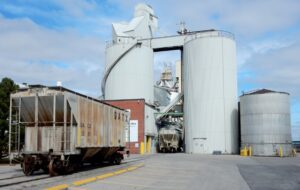
The National Silicates global manufacturing company that was in operation in South Etobicoke for 92 years is being demolished for condos. Photo by Susie Basheir.
One of the older global manufacturing companies in South Etobicoke that was in business for almost 100 years is being flattened for what else but more condos.
National Silicates has been a fixture at 429 Kipling Avenue, at Horner Avenue, since 1815. It shut down after 92 years of conducting business in 19 countries in all five continents.
The Kipling Avenue plant in its prime employed 100 employees, who retired or were laid off. The firm at one time had 1,500 employees and generated over $800 million in revenue.
The company goes back to 1815, with Joseph Crosfield and Sons in Warrington, England; and 1831, with Joseph Elkinton and Sons in Philadelphia, started with the manufacture of candles and soaps, beginning a two-century story of innovation.

The National Silicates plant that once operated in five continents will soon be gone from the Horner and Kipling area.
Heavy machinery are now demolishing the plant in preparation for the construction of a new industrial condo building that will be divided into 13 units.
The proposal calls for more than 100 parking spots, 15 electric vehicle parking spaces and 10 for bicycles.
“The proposal will replace an existing industrial building and provide for a new modern development that will align with the goals and demands in the City of Toronto,” according to the developers.
National Silicates won awards for business excellence, encouraged employees to volunteer in their communities, and was a supporter of the Santa Claus Parade, Tree Planting in Marie Curtis Park, LAMP, Dorothy Ley Hospice, Women’s Habitat and the Jean Tweed Centre.
“As we close our doors for the last time, we leave behind an amazing community,” a former employee said. “We are friends and most of us are, in reality family.”
The firm was headquartered in Toronto and had production and distribution facilities in Valleyfield, Quebec; Toronto, Fort Frances, Whitecourt, Alberta; Surrey and Parksville, B.C.
The company’s Global Centre for Pulp and Paper Excellence was in Etobicoke and staffed by highly trained scientists who conducted research and development, as well as technical service.
Its principal product is sodium silicate used in the bleaching of wood pulp for paper manufacture and water treatment, among its many uses.
The company and its affiliates was the world’s largest producer of sodium and potassium silicates, according to its website.
